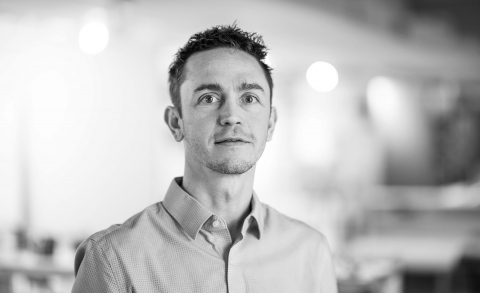
Last month PAYETTE’s Young Designer Core (YDC) enjoyed a visit to custom-mosaic fabricator Artaic. Just a short walk from our office, the Artaic studio is housed in the Innovation and Design Building, overlooking an active dry-dock in Boston’s Seaport District.

The Artaic team welcomed us to their fabrication space with drinks and appetizers before Blake Goodwin, Director of Sales and Operations, launched into a presentation describing the group’s unique approach to custom tile mosaic design and production.

Launched 8 years ago by a team including serial-tech-entrepreneur Ted Acworth, Artaic pairs a design-focused approach with the efficiencies of robotic fabrication.
Key to this process is proprietary software called Tessera, which takes an input image and breaks it down into ‘tiles’ of varied color based on user-defined parameters like mosaic size and tile type. After some fine-tuning (such as color and contrast adjustments), the software outputs both digital images of the design as well as instructions for a CNC robotic arm to construct the pattern.
Artaic currently uses an off-the-shelf Fanuc 5-axis robotic arm to implement a simple pick-and-place protocol. Tiles of various colors are fed to the robot with dedicated sleeves. The robot selects the appropriate sleeve, takes a tile and places it in a specific position on a gridded tray. When the tray is full, the tiles are adhered to a polymer backing sheet. A collection of these tile assemblies are shipped to the customer where they are installed using conventional methods.

With this process, Artaic provides their clients with rapid design iterations and visualization as well as expedited production – the robotic arm assembles custom patterns 10x faster than a highly skilled human worker. This methodology is relatively unique within a sector of the tile industry that still relies heavily on the labor-intensive process of manually placing individual mosaic tiles.
As Blake concluded his presentation and began to answer questions, I snuck away to the R+D side of the studio (Top Secret – No Photos!) to see what else their engineering team had cooking: Back in 2011, Artaic received a $150k SBIR Phase I Grant to develop a ‘High-Throughput Agile Robotic Manufacturing System for Tile Mosaics.’ In 2012, a $500k SBIR Phase II Grant followed, to support further development of the project. The results of these ongoing initiatives were in evidence: I observed several prototypes in various stages of completeness. These new models explored different strategies to increase production speed. Without giving away any secrets, key tactics included: reducing the number of required movements, collecting/placing multiple tiles at a time or using multi-head systems (think several inkjet printers running synchronously.) While these new models are still a few years away from being production-ready, increased fabrication speed will decrease production costs, bringing custom mosaic tile within the reach of a larger market.
Our thanks to the Artaic team for a fun and informative tour. Exciting work!


